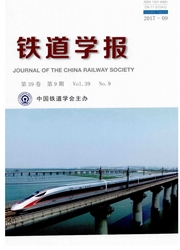

 中文摘要:
中文摘要:
针对动态认知无线电网络中频谱检测性能与资源消耗之间的矛盾,提出一种分布式协同优化的频谱检测算法。设置双门限将认知用户分成可信组和非完全可信组。采用次梯度法对频谱检测效用函数进行分布式协同优化,动态调整能量检测阈值,提高动态变化网络环境中的非完全可信认知用户检测结果的准确性,并根据优化过程的收敛速率,从中选择参与协作的认知用户。最后融合中心通过加权融合获得频谱检测结果。仿真实验和分析表明算法在提高认知用户频谱检测准确性和检测速度的同时,降低了网络开销。
 英文摘要:
英文摘要:
Considering the tradeoffs between spectrum sensing performance and resource consumption in dynamic cognitive radio networks, the spectrum sensing algorithm is proposed on the basis of distributed cooperative optimization. Double thresholds are used to divide the Cognitive Radio (CR) users into the trusted group and the incompletely trusted group. To improve the accuracy of spectrum sensing of the incompletely trusted group users’ in the dynamic network environment, the sub-gradient algorithm is used to optimize the utility function of spectrum sensing in a distributive and cooperative manner. In this algorithm, the energy sensing threshold is dynamically adjusted. On the basis of the convergence rate of optimization, cooperative users are dynamically selected. Finally, an overall decision is obtained at the fusion center by the weighted combination of all data. Simulation results show that the proposed method enhances both the accuracy and speed of spectrum sensing and reduces the overhead of the cognitive radio networks at the same time.
 同期刊论文项目
同期刊论文项目
 同项目期刊论文
同项目期刊论文
 Modelling and control design for an electro-pneumatic barking system in trains with multiple locomot
Modelling and control design for an electro-pneumatic barking system in trains with multiple locomot An Adaptive Unscented Particle Filter Algorithm through Relative Entropy f or Mobile Robot Self-Loca
An Adaptive Unscented Particle Filter Algorithm through Relative Entropy f or Mobile Robot Self-Loca An Adaptive Unscented Particle Filter Algorithm through Relative Entropy for Mobile Robot Self-Local
An Adaptive Unscented Particle Filter Algorithm through Relative Entropy for Mobile Robot Self-Local A Uniform Energy Consumption Algorithm for Wireless Sensor and Actuator Networks Based on Dynamic Po
A Uniform Energy Consumption Algorithm for Wireless Sensor and Actuator Networks Based on Dynamic Po Modelling and control design for an electro-pneumatic braking system in trains with multiple locomot
Modelling and control design for an electro-pneumatic braking system in trains with multiple locomot 期刊信息
期刊信息
